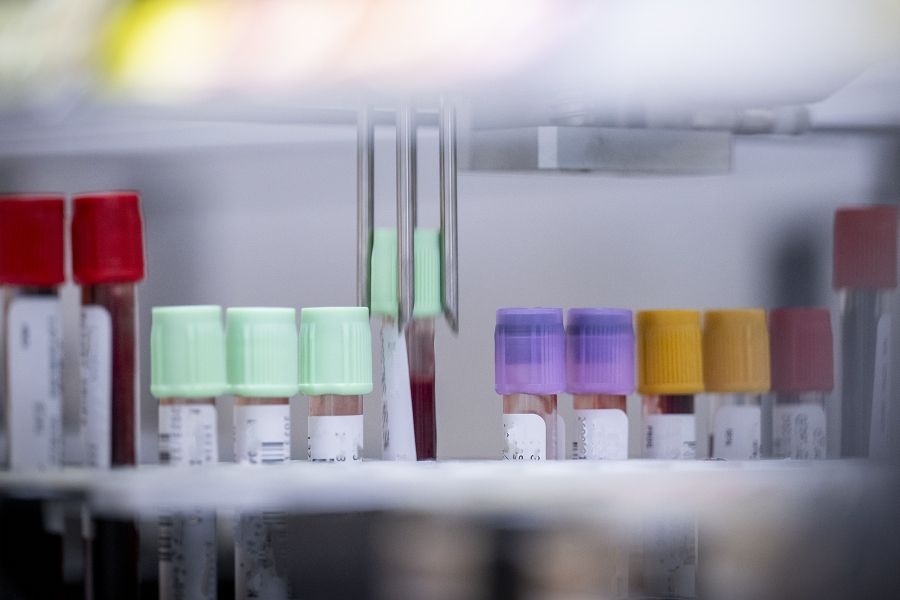
Researchers affiliated with the KGH Research Institute have been awarded a total of $3.56M in funding from the Canadian Institutes of Health Research (CIHR) to support 6 key research projects focusing on new treatments for patients.
“Our researchers are leading the way in advancing discoveries that are helping us better understand human health and disease,” says Dr. Steven Smith, President & CEO of KGHRI. “Their work has the potential for promising new therapies that can dramatically change patient lives.”
Dr. Sheela Abraham (Biomedical and Molecular Sciences) - Elucidating the role extracellular vesicles play in leukaemogenesis
Dr. Abraham’s research is focused on signalling events critical to the development and maintenance of both normal haematopoietic stem cells (HSCs) and leukaemic (cancerous) stem cells (LSCs). Dr. Abraham’s lab is investigating blood extracellular vesicles (EVs), which are produced at different life stages of healthy humans, to understand how they affect the health and maintenance of HSCs and how they relate to.
Dr. Abraham’s group was the first to identify that blood EVs are continuously maintained over adulthood and change in composition over time. Current research projects are focused on understanding how cancerous leukaemic stem cells evolve, with the goal of identifying malignancy at its earliest stages and targeting the cancer before it is fully established.
Dr. Kerstin de Wit (Emergency Medicine) - PEITHO-3. Reduced-dose thrombolytic treatment for patients with higher-intermediate risk acute pulmonary embolism
Dr. de Wit is an emergency physician with research interests in thrombosis, which studies the formation of blood clots. The PEITHO-3 study is an international study that includes over 30 European countries researching the use of a powerful treatment in very ill people with pulmonary embolism, which is caused by blood clots in the lung and can be fatal if not treated. The study will examine the benefits versus the risks of side effects of taking the drug.
The study is aimed at a very focused population and so requires participation from a number of research centres to validate results. Dr. de Wit is leading the Canadian research efforts in concert with the Canadian Venous Thromboembolism Research Network and the Network of Canadian Emergency Researchers. Canada’s participation will help to support the study in terms of patient numbers, but will also help to ensure that we understand the results from a Canadian health system perspective.
Dr. Ian Gilron (Anesthesiology & Perioperative Medicine): The PRECISE trial – Pain Relief Combination Intervention StratEgies
Dr. Gilron’s research team is focused on studying the mechanisms of, and treatments for, chronic and acute pain. Chronic pain affects 20-30% of Canadians, costs more than $650 billion each year in North America and has a significant impact on quality of life.
Over half of pain sufferers are treated with two or more analgesic drugs, but evidence for combination therapy is limited and more research is needed. This study will compare pain reduction with a specific drug combination to each drug alone, building on this research team’s previous CIHR-funded trials that have shown improved patient outcomes and have provided a framework to evaluate novel combinations for chronic pain and sleep disturbances.
This bridge funding to support further funding applications will guide improvements in therapy by advancing knowledge about rational combination therapy for chronic pain. As part of the Canadian Chronic Pain Network, this work will provide opportunities for subsequent real-world trials and related knowledge translation efforts across Canada and beyond.
Dr. Gilron’s collaborative research team at Queen’s includesSylvia Robb RN, Drs. Dongsheng Tu, Ronald Holden, Roumen Milev and Tanveer Towheed.
Dr. Annette Hay (Medicine) - Randomized Phase 3 Evaluation of Lower Dose (3-2-1 Strategy) vs. Full Dose of Ibrutinib for the Treatment of Chronic Lymphocytic Leukemia
Dr. Hay’s research interests include clinical trials for patients with hematological malignancies, data sharing and linkage, and health economics. She and her collaborators, including co-Principal Investigator Dr. Matthew Cheung, Patient Advisor Ms. Marg Redlick, and partners across Canada and the US, are studying the treatment of chronic lymphocytic leukemia (CLL), an incurable blood malignancy, and aim to compare the effectiveness of two ibrutinib dose strategies. Ibrutinib, while used to treat CLL, often results in negative consequences such as major bleeding and heart rhythm abnormalities.
Recent work on dose reduction strategies confirmed that at lower doses these consequences are diminished, while the activity of ibrutinib can be fully maintained. This project will evaluate a lower dose against full dose of ibrutinib, with the goal of reducing patients’ side effects and treatment costs.
Dr. Amer Johri (Medicine) - Intraplaque Composition Combined with Stress Echo for Cardiac Risk Stratification (CIRCE)
Stress echo (SE) is one of the most accessible tests used to select patients for angiography, but suffers from moderate sensitivity and specificity for cardiovascular (CV) outcomes. In Ontario alone, of the more than 100,000 SEs performed every year, 90% are normal, and patients may have little follow-up.
Dr. Johri’s team has demonstrated that adding carotid plaque assessment by ultrasound to the SE is feasible and improves testing. This prospective, parallel 6-centre study is being conducted across Canada and will assess intraplaque nevovascularization (IPN), which occurs in response to hypoxia or inflammation within the lesion, resulting in a network at risk of rupture and hemorrhage. The study is expected to show increased predictive power for major adverse cardiovascular events.
Dr. Michael Rauh (Pathology and Molecular Medicine) - Dysregulation of TET2 and DNMT3A promotes pulmonary arterial hypertension (PAH) through inflammation: A new mechanism of PAH
Dr. Rauh’s lab has helped identify common, pre-leukemic mutations in blood cells with aging. This condition that affects at least 15% of adults older than 60 years is called clonal hematopoiesis (CHIP). Detection of CHIP with a relatively simple blood test opens the door to blood cancer surveillance and prevention. Also, his group has shown that the most common mutations in CHIP blood cells, affecting the epigenetic regulators TET2 and DNMT3A, increase inflammation and exacerbate non-cancerous diseases. He and his collaborators are developing means to target these mutant cells, providing novel opportunities to optimize health in aging.
This collaborative project, a partnership between Dr. Rauh and Dr. Stephen Archer (Queen’s Cardiopulmonary Unit), will focus on pulmonary arterial hypertension (PAH), a lethal, pro-inflammatory condition of increased blood pressure within the arteries of the lungs. The study builds on earlier work with promising data showing the potential of TET2/DNMT3Amutations or decreased expression to predict disease development and outcome and to understand how dampening the resulting inflammation can lead to promising new treatments for PAH patients.





